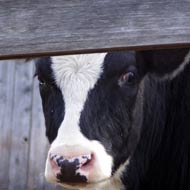
Action is "long overdue", says BVA president
A government e-petition launched by BVA has called for an end to non-stun slaughter and clearer labelling of food products.
BVA has long campaigned for a ban on the practice and believes it "unnecessarily compromises animal welfare."
Currently, European and UK legislation requires animals to be pre-stunned to render them insensible to pain before slaughter. However, the law allows slaughter without pre-stunning in certain religious communities - Dhabihah for Halal meat and Shechita for Kosher food.
BVA says this affects "millions of animals" every year.
It is stressed in the petition that the campaign relates to concerns about animal welfare, not religious beliefs. BVA says it is important to note that more than 80 per cent of Halal slaughter in the UK is pre-stunned.
While non-stun slaughter is permitted, BVA is also calling for clearer labelling of food to indicate the slaughter method. There are concerns that people are not able to make an informed choice as there is no requirement to label meat with the method of slaughter.
Government figures released in April revealed mis-stunning incidents in British abattoirs are rare - animals are correctly stunned in 99 per cent of cases.
BVA said this deflates the myth that mis-stunning occurs frequently and presents a greater welfare issue than non-stun slaughter - a theory suggested by those who oppose a ban on the practice.
According to BVA president Robin Hargreaves, the organisation was "overwhelmed" with letters of support from the public and veterinary profession when the figures hit the headlines recently.
It is hoped that the petition will receive the 100,000 signatures it needs to be debated in the House of Commons.
View the petition online: http://epetitions.direct.gov.uk/petitions/64331



 The latest
The latest